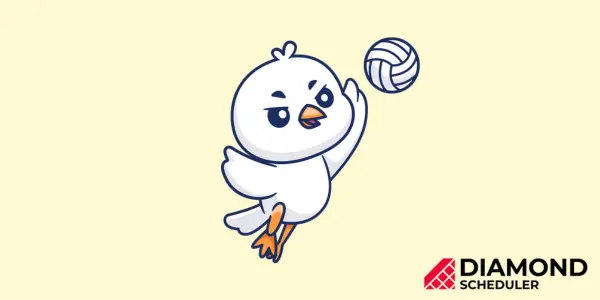
Unraveling the Timelines: When is Volleyball Season?
Volleyball, a thrilling and dynamic sport, captures the hearts of players, enthusiasts, and fans worldwide. To truly understand the essence of this sport, one must delve into the intricacies of volleyball seasons. Whether it's indoor or beach volleyball, snow volleyball, or even high school volleyball, each season brings its own excitement, challenges, and opportunities.
In this comprehensive article, we will explore the timelines, major competitions, and key highlights of each volleyball season, from college and high school leagues to international tournaments.

Indoor volleyball season
Embracing the thunderous roar: timeline and duration
The indoor volleyball season is a much-anticipated affair, offering athletes and fans an exhilarating experience. Typically, the indoor season kicks off in early September and extends through late spring or early summer. From the first serve to the last spike, these months are packed with adrenaline-pumping matches.
This type of volleyball has its roots in the United States, where it originated as a recreational activity in gyms during the late 1800s. The sport quickly gained popularity, leading to the formation of the first professional volleyball league, the United States Volleyball Association (USVBA), in 1928. Over the years, the sport has evolved and spread globally, with leagues and competitions being established in various countries.
Battling for glory: Major leagues and competitions
The indoor scene boasts prestigious leagues, including the Polish and Russian leagues, that showcases world-class talent. The Polish PlusLiga and Russian Super League attract some of the most skilled players from around the world, making these leagues highly competitive and thrilling to watch.
On the collegiate level, the college volleyball season in the United States is a highlight of the indoor volleyball season calendar. The National Collegiate Athletic Association (NCAA) oversees college volleyball competitions, where universities from across the nation compete for glory and bragging rights. These college-level matches not only showcase the immense talent of young players but also foster a strong sense of school spirit and pride among students and alumni.
The NCAA Division I Women's Volleyball Championship is one of the most anticipated events in college volleyball. Held in December, the championship features the top collegiate women's teams battling for the national title. The intense rivalry and skill on display during these matches captivate fans and leave a lasting impact on players' careers.
Reaching new heights: Peak months for tournaments and championships
The indoor volleyball season reaches its zenith during winter and spring. Fans can witness the drama unfold in national and international championships as athletes compete for victory and everlasting glory. The Fédération Internationale de Volleyball (FIVB) hosts World Championships for both men and women every four years during the winter and spring season, drawing the best national teams from around the globe.
In addition to the World Championships, the FIVB also organizes other major international tournaments, such as the World Cup and the Volleyball Nations League (VNL). The VNL, established in 2018, has become one of the most prestigious annual events in volleyball, featuring elite national teams competing across multiple weeks of intense matches.
Beach volleyball season
Beneath the sun and sand: exploring the timeline
As temperatures rise, beach volleyball season commences, creating a vibrant ambiance for players and spectators alike. Starting from early spring and stretching to late summer, beach volleyball delivers a unique outdoor experience, which includes different court dimensions and amount of players participating in the game
Beach volleyball has a rich history, originating from the sandy beaches of California in the 1920s. Initially played for recreational purposes, the sport quickly gained popularity, and dedicated beach volleyball tours and events were established. The sport's inclusion in the 1996 Summer Olympics solidified its status as a global sensation.
Craving the golden sands: Notable International tournaments
The FIVB Beach Volleyball World Tour and the Olympic Games captivate the world during beach volleyball season. These events gather elite athletes from across the globe to showcase their skills on the glistening sand.
The FIVB Beach Volleyball World Tour features a series of international events held in different countries, with players accumulating points throughout the tour. This culminates in the prestigious FIVB Beach Volleyball World Championships, held biennially, attracting spectators to witness top-notch beach volleyball action.
The Olympics, held every four years in the summer, is the pinnacle of international sportsmanship, where athletes from various countries compete across multiple disciplines, including volleyball. Beach volleyball at the Olympics draws huge crowds, and its inclusion has added an extra layer of excitement to the Games.
Riding the wave: Best periods for competitions
The official beach volleyball season starts in late April, with events held in picturesque locations worldwide. Spectators revel in the warm weather and breathtaking beachside settings while witnessing electrifying matches unfold.
Locations like Copacabana Beach in Rio de Janeiro, Brazil, and the California coast in the United States host iconic beach volleyball tournaments that attract participants and spectators from near and far. The summer season creates an idyllic backdrop for competitive beach volleyball, adding to the sport's appeal.
Snow volleyball season
Embracing the chill: introduction to snow volleyball
Snow volleyball, an emerging winter wonderland sport, embraces the chill as players engage in thrilling matches on snow-covered terrains. This unique variant of volleyball captivates players and fans, combining the excitement of beach volleyball with the thrill of winter sports.
The sport's inception can be traced back to the early 2000s when informal matches were played on snowy landscapes in Europe. As interest grew, the Fédération Internationale de Volleyball (FIVB) officially recognized snow volleyball, paving the way for its development and popularity.
Winter whispers: timeline and regions
Snow volleyball season typically commence from late December to early March, inviting players to snowy locations worldwide. Mountain resorts and ice-capped cities become the setting for exhilarating snow volleyball competitions.
Regions with a vibrant winter sports culture, such as Europe and certain parts of Asia and North America, have been at the forefront of popularizing snow volleyball. The sport's international federation, the FIVB, actively supports the development of snow volleyball, making it accessible to players in various winter-sport-loving nations.
Frosty showdowns: global tournaments and championships
As snow volleyball gains popularity, major events like the Snow Volleyball European Championships and World Tour showcase thrilling matches and electrifying showdowns.
The Snow Volleyball European Championships attract teams from snowy nations such as Austria, Germany, and Switzerland, where the sport has a strong following. The tournament sees players adapt their techniques and strategies to the snowy conditions, showcasing their skill and versatility on the winter courts
Fédération Internationale de Volleyball (FIVB) snow volleyball highlights | Snow Volleyball WorldHigh school volleyball season
A journey of growth: Overview of timelines
High school volleyball seasons mirror the traditional academic year, starting in late summer and extending until early winter. This period nurtures young talents, fostering their skills and teamwork during the school season and developing them from mere high school players to players ready for the college season.
High school volleyball offers a foundation for budding players to develop their skills, learn the fundamentals of the game, and embrace teamwork. These formative years allow students to grow both as athletes and individuals, setting the stage for potential future success in higher levels of the sport.
Seeds of tomorrow: Impact on player development
High school volleyball leagues play a vital role in nurturing future stars, promoting discipline, camaraderie, and fostering a love for the sport among young athletes.
The high school volleyball season acts as a stepping stone for players aspiring to compete at the college or professional level. Apart from honing their athletic abilities, students learn essential life skills such as leadership, time management, and resilience through the highs and lows of the season.
Shining through the nets: Successful high school programs
Several high schools have created winning structures for their high school volleyball programs. Some high schools have established volleyball programs renowned for their consistent success in regional and national competitions.
These programs often boast a dedicated coaching staff, state-of-the-art facilities, and a strong sense of community support, which contribute to their ongoing triumphs.
College volleyball season
The collegiate showdown: Timeline and thrills
College volleyball ignites passion on campuses nationwide, beginning in late summer and culminating in late fall or early winter. Witness the intensity of rivalries and the pursuit of victory among collegiate teams.
College volleyball season creates a vibrant atmosphere on campuses as students rally behind their teams. The competitive spirit and passionate fandom contribute to the electric atmosphere that accompanies college volleyball matches.
Michella Chester's top women's volleyball team | NCAA ChampionshipsNCAA glory: championships and rivalries
NCAA volleyball tournaments are the epitome of college-level competition, where skilled athletes and passionate fans unite to celebrate the essence of volleyball.
The NCAA Division I Women's Volleyball Championship is one of the most anticipated events in college volleyball. Held in December, the championship features the top collegiate women's teams battling for the national title.
The intense rivalry and skill on display during these matches captivate fans and leave a lasting impact on players' careers.
College courts abuzz: Notable events and matches
From intercollegiate showdowns to regional clashes, the college volleyball season presents a multitude of exciting events that keep fans on the edge of their seats.
College volleyball season is filled with thrilling matches that see teams from different regions, and conferences compete against one another. Events like the Big Ten-Pac-12 Challenge and the AVCA (American Volleyball Coaches Association) Showcase features top-notch college teams, making them must-watch competitions for volleyball enthusiasts.
National and International volleyball leagues
The grand stage: seasonal variations of national leagues
National volleyball leagues have their unique timelines, with some running throughout the year and others spanning specific months. Explore the diversity and intensity of leagues across the globe.
Professional volleyball teams participate in national leagues, showcasing their talent and competing for domestic glory. The Italian Serie A1, Brazilian Superliga, and Japanese V.League are prominent examples of national leagues with a rich history and a dedicated fan base.
A global spectacle: Overview of International volleyball calendar
International volleyball events, such as the VNL and the Olympics, bring nations together in the spirit of sportsmanship and unity.
The Volleyball Nations League, a relatively new addition to the international volleyball calendar, has rapidly become one of the most important volleyball competitions. The tournament features a rotating host system, with multiple cities around the world hosting matches, allowing fans worldwide to witness elite-level volleyball.

All year-round volleyball clubs help athletes.
Club Volleyball Season
Volleyball on the club level plays a pivotal role in developing young talents and preparing them for higher levels of competition. Operating outside the traditional school and college seasons, this type of volleyball provides year-round training and opportunities for players to showcase their skills.
The teams that play volleyball for clubs are often organized by private organizations or clubs, allowing players from various schools to come together and compete as a unified unit. These teams participate in local, regional, and national tournaments, offering players exposure to higher levels of competition and a chance to be scouted by a college recruiter
The club volleyball season calendar
Unlike school and college seasons, the club season does not adhere to a fixed timeline and operates throughout the year. Many clubs offer programs that run from fall to spring, while others provide training and tournaments during the summer months as well.
The flexibility of the club volleyball calendar allows players to continue their training and development beyond the school and college seasons. It also provides opportunities for athletes to participate in more matches and gain valuable experience, ultimately contributing to their growth as players.
Pursuit of excellence: Competitions
Club competitions showcase some of the most skilled and promising players in the sport. National club championships, such as the USA Volleyball Girls Junior National Championships, are highly prestigious events that attract scouts and college coaches.
Participating in club volleyball competitions allows players to challenge themselves against top-tier opponents from across the country. The intensity and high level of play in these tournaments serve as a proving ground for young athletes looking to make their mark in the volleyball world.
Frequently asked questions
Whether it's indoor or beach volleyball, snow volleyball, or even high school volleyball, each season brings its own timeline, excitement, challenges, and opportunities.
How many volleyball seasons are in a year?
Volleyball has multiple seasons depending on the variant. Indoor volleyball typically spans from early September to late spring or early summer. Beach volleyball is played during the warmer months, starting in early spring and continuing until late summer. Snow volleyball typically runs from late December to early March.
How many months does volleyball season last?
The duration of volleyball seasons varies based on the type of volleyball being played. Indoor volleyball season lasts around 8 to 9 months, starting in early September and concluding in late spring or early summer. Beach volleyball season spans approximately 4 to 5 months, from early spring to late summer. Snow volleyball season typically runs for about 3 months, from late December to early March.
Is volleyball a seasonal sport?
Yes, volleyball is a seasonal sport with different variants having specific seasons. Indoor volleyball is a popular winter and spring sport, while beach volleyball thrives in the warmer months of spring and summer. Snow volleyball, on the other hand, embraces the winter season and snowy terrains for its competitions.
What is men's volleyball season?
Men's volleyball season aligns with the overall volleyball calendar. Indoor men's volleyball typically begins in early September and extends through late spring or early summer. Beach volleyball is also played by men during the warmer months, starting in early spring and continuing until late summer. Snow volleyball for men operates during the winter months, from late December to early March.
Conclusion
The captivating world of volleyball unveils a tapestry of passion, dedication, and talent. From indoor thunderstorms to sun-soaked beaches and winter wonderlands, each season carries its allure and significance. Understanding the timelines and festivities of volleyball seasons enhances the experience for players, fans, and league organizers alike.
As you plan, participate, and support volleyball at various levels, take advantage of the power of Diamond Scheduler’s software to create seamless and engaging volleyball seasons year-round. Embrace the rhythm of volleyball seasons, and let the love for this exhilarating sport unite players and fans across the globe.
Thalia Oosthuizen has been writing in a professional capacity for over a decade. Her love for sports has led her down the path of sports writing, where her passion and skills combine. Thalia is a runner, cyclist, and swimmer, and enjoys playing tennis and hockey. Her favorite sports teams include Chelsea F.C. and the Georgian Lions Rugby Club.
About Diamond Scheduler
Diamond Scheduler makes planning your league’s complex season easier than ever. Create your first schedule in minutes for free. It's fast, fun, and simple.



